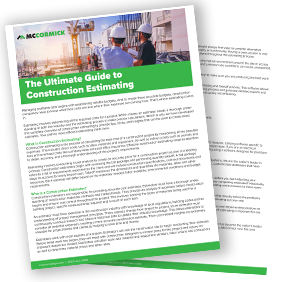Building Strong Relationships with Construction Material Suppliers

by Paul Wheaton
November 7, 2024
In the world of construction estimating, material costs can make or break a project.
Building strong relationships with construction material suppliers is essential for estimators to keep projects on time, on budget, and profitable.
According to the U.S. Chamber of Commerce, construction materials typically make up 40-60% of the total cost of a project.
With fluctuating material prices and supply chain challenges, finding construction material suppliers who provide not just competitive pricing but reliability, flexibility, and transparency can offer a strategic advantage.
Creating solid partnerships with these suppliers can lead to better prices and reliable deliveries to improve your construction bids.
But how do you go about finding suppliers you can trust? And once you find them, how do you maintain positive relationships that benefit both parties?
Let’s dive into how building supplier relationships can impact construction estimating and how to cultivate these partnerships for long-term success.
Key Takeaways for Construction Estimators:
- Conduct thorough research on suppliers’ reputation, product range, delivery capabilities, and supply chain management.
- Focus on suppliers offering consistent quality, faster delivery, or bulk discounts.
- Ensure suppliers can meet your delivery timelines by asking about lead times, handling of rush orders, and their approach to supply chain disruptions.
- Understand the fine print of supplier agreements, including hidden fees, minimum order quantities, and warranties.
- Use digital tools like construction estimating and takeoff software to streamline communication, track costs, and ensure timely material delivery.
How to Find Reliable Suppliers
The first step in building strong relationships with construction estimating material suppliers is finding the right ones.
Research and Vet Potential Suppliers
Research is key. Start by asking peers in the construction industry for recommendations, checking reviews, or even attending trade shows to get a firsthand look at different suppliers.
Once you’ve compiled a shortlist, ask about:
- Their product range
- Lead times
- How they handle rush orders
Check that they can deliver consistently, even when the market is tight, and ask about how they respond to supply chain disruptions.
Knowing this beforehand can help simplify the construction estimating process.
Price Isn’t Everything
Price is, of course, a fundamental factor. But keep in mind that competitive pricing doesn’t always mean the cheapest option.
Cheap materials for construction estimating can sometimes mean lower quality, which can affect your project timelines and lead to costlier repairs down the road.
It’s worth paying more for a reliable supplier that offers consistent quality, faster delivery, or bulk discounting — all of which can save you money in the long term.
Assess Delivery Capabilities
Suppliers that meet your delivery timelines are as crucial as those offering competitive pricing.
Before signing a contract with a supplier, ask about:
- Their lead times
- How they handle rush orders
- Their approach to mitigating supply chain disruptions
Delays in material delivery can lead to downtime on job sites, increased labor costs, and frustrated clients.
Review Supplier Terms and Conditions
Clear agreements upfront can prevent misunderstandings later.
You’ll want to review their terms and conditions carefully, paying attention to any hidden fees, minimum order quantities, or warranties.
Understanding these details ensures you know exactly what to expect from the partnership.
Cultivating Strong Supplier Relationships
Once you’ve selected your suppliers, maintaining a healthy, long-term relationship with them is vital for the construction estimating process.
Communication Is Key
Open lines of communication form the foundation of any successful partnership. Be upfront about your expectations for:
- Quality
- Delivery schedules
- Budgets
Regular check-ins with your suppliers can also help you stay on top of potential issues like rising material costs or project delays. This will help ensure that you have successful construction projects.
Negotiate Agreements
Negotiation is another critical aspect of the relationship. When discussing terms, try to create agreements that work for both sides.
For example, committing to a long-term contract or bulk purchases can often lead to better construction material pricing.
On the other hand, be open to flexible payment terms if they benefit both you and your supplier.
Be Consistent and Reliable
It’s important to remember that your suppliers rely on you just as much as you rely on them.
That means:
- Paying invoices on time
- Providing accurate forecasts of your material needs
- Following through on your commitments
This consistency can build trust and foster a long-term, mutually beneficial relationship.
Leverage Technology for Better Collaboration
Technology can also play a significant role in how you collaborate with suppliers.
Digital tools like construction estimating and takeoff software can help streamline communication by providing accurate material quantity takeoff, tracking material costs, and automating pricing.
These tools allow both you and your suppliers to stay aligned, ensuring materials are delivered when and where they’re needed to simplify the construction takeoff process.
Estimating software typically comes with functionalities that compare prices between all your preferred options — enabling you to select the best-priced choice for a specific project. Then, the software will apply those prices to your quantities with a simple click, saving you valuable time and effort.
This level of automation ensures that both you and your suppliers are aligned on project needs and deadlines, simplifying the construction takeoff process and ensuring materials are delivered when and where they’re needed according to the project schedule.
Additionally, estimating technology can automate some aspects of communication, keeping everyone informed and aligned on project specifications and deadlines and helping you have a smooth construction process.
Manage Supplier Risk Proactively
While good relationships with construction supply companies can reduce uncertainty, it’s still essential to manage risk.
Effective supply chain management involves building material suppliers, so any disruptions on their end can have a cascading effect on your projects.
For example, a sudden price hike in raw materials or a shipment delay can throw off your entire schedule.
Diversify Your Suppliers
One way to mitigate risk is by diversifying your supplier base. Relying too heavily on a single supplier can leave you vulnerable if they experience disruptions. This can put current and future projects at risk.
Developing strong vendor relationships with multiple suppliers for key materials ensures you have backup options if something goes wrong.
Monitor Market Conditions
The construction procurement process is never static. That’s why it’s important to stay informed about market trends, as material costs fluctuate due to various factors.
Maintaining communication with suppliers about anticipated price changes or supply issues can help you adjust your estimates and bids accordingly.
Have Contingency Plans
Having contingency plans in place can help you deal with unforeseen supplier issues.
This could involve pre-negotiating with multiple vendors, keeping a small inventory of critical materials on hand, or simply maintaining a list of backup suppliers.
Contingency plans are a key component of the process that can help you have project success.
See How McCormick Can Simplify Your Estimating Processes
Building strong relationships with suppliers is a strategic move for any estimator.
Reliable suppliers provide more than just materials — they offer stability, pricing transparency, and the flexibility to navigate unpredictable markets.
By investing time in finding the right suppliers, negotiating fair agreements, and maintaining clear communication, you’ll be better positioned to create accurate estimates and deliver successful projects.
In an industry where material costs can fluctuate drastically, having a reliable network of construction material suppliers is necessary for staying competitive and having the best project quality.
With the right partners and tools — such as McCormick construction estimating and takeoff software — you can take control of your material costs, create more accurate bids, and win more projects.
See how McCormick helps you win big electrical jobs by talking to a specialist today!
Share Article


